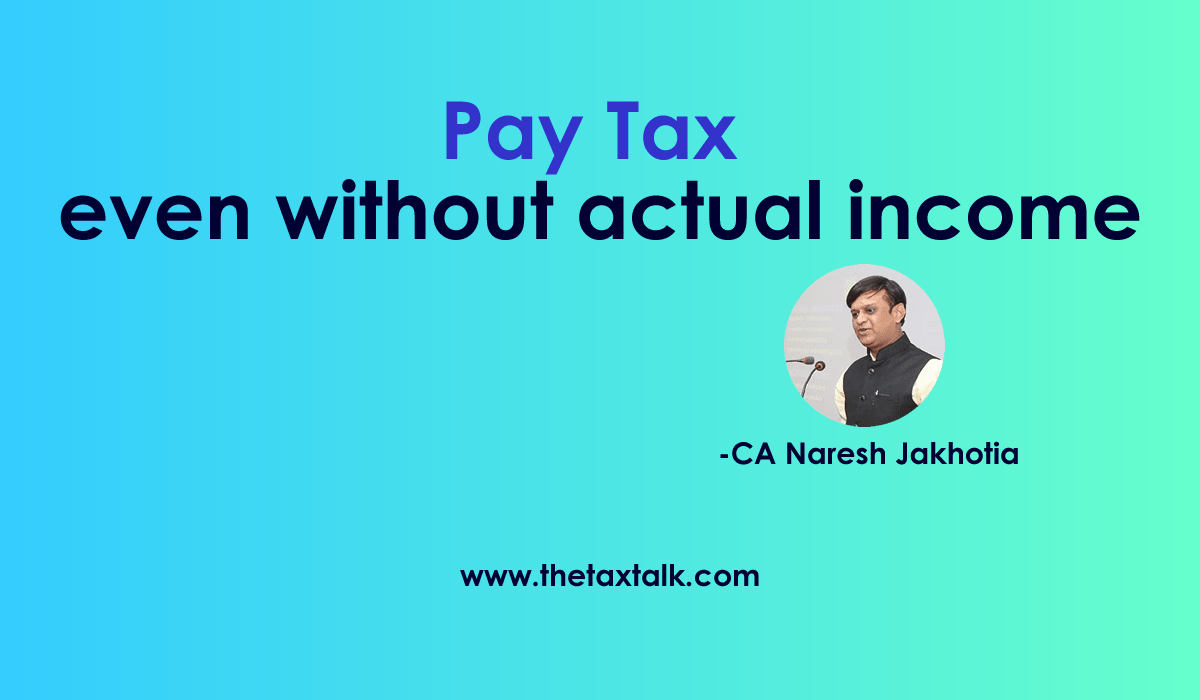![]()
Pay Tax even without actual income
Income Tax is on Income is the general belief of the citizens. It’s a myth & an irony. There are so many provisions in the Income Tax Act which imposes tax even if there is no income in the common parlance. Amendment is carried out in the Income Tax Act year after year to widen the tax net of such hypothetical income, not real in nature. Few of such instances where tax liability arises without income are as under:
- Owning more than one house property:
If the taxpayer owns more than one house properties then only one house property is considered as self occupied house property. The other house properties are deemed to have been let out even though such property is not actually let out or the same is lying vacant. Tax is payable on notional rental income in such cases even without actual rent receipt. “One person – one house” is the normal principle followed to avoid the tax implications in such cases. - Selling or buying property below stamp duty valuation:
If the property is sold at a value lesser than stamp duty valuation then income is required to be calculated taking stamp duty valuation. Stamp duty price is a benchmark price for taxation purpose. For example, a person has sold a property for Rs. 50 Lakh having a stamp duty valuation of Rs. 75 Lakh. In such case, capital gain would be required to be calculated by taking Rs. 75 Lakh i.e., Income tax is applicable on an extra amount of Rs. 25 Lakh even though Rs. 25 Lakh is not the real income. Even builders are not an exempted from the said rule. They are also liable to pay the tax on the basis of stamp duty valuation.
Recent amendment in the Income Tax Act has given slight relief to the taxpayer from dreadful taxing provision. If the amount of stamp duty valuation is not excess of 5% of the actual consideration then nothing would be taxable on notional basis. However, if it exceeds 5% then entire amount would be taxable. For example, if the property is sold for Rs. 1 Cr and the stamp duty valuation is Rs. 1.05 Cr then tax would be payable on the basis of Rs. 1 Cr and not on the basis of Rs. 1.05 Cr. However, if the property is sold for Rs. 1.06 Cr then tax would be payable by considering Rs. 1.06 Cr and not Rs. 1.01 Cr (i.e., amount over and above 5%). In short, concession is provided only if the variation is up to 5%. Further, stamp duty valuation on the date of agreement to sale could be considered for taxation purpose if the transaction at the time of agreement is done by account payee cheque/draft or ECS. - Purchasing the property below stamp duty valuation:
Continuing with the above example, the buyer is also liable to be taxed on Rs. 25 Lakh if the property with stamp duty valuation of Rs. 75 Lakh is purchased for Rs. 50 Lakh. It is presumed that the buyer has earned Rs. 25 Lakh by purchasing the property below stamp duty valuation.
For the same amount, two persons could be made liable to pay the tax. Illogical it may sound, but law and logic are not always on the same side of the coin. Like in the case of seller, deviation up to 5% of the actual sale consideration and stamp duty valuation as on the date of agreement as mentioned in above is also allowed in the hands of purchasers as well.
(The scope of taxation is not only restricted to transactions of immoveable properties. It is now stretched to even shares & few other assets also) - Tax on business Income:
There are numerous provisions whereby businessmen are made liable to pay tax on additional amount which are not actual business income. One of the most common instances is disallowance of expenses to the extent of 30% of the expenses if the payment exceeding Rs. 10,000/- is done in cash. For example, a person has purchased goods for Rs. 1 Lakh in cash and sold it for Rs. 1.10 Lakh. Though the actual profit in the transactions is Rs. 10,000/- only, still the tax would be payable on Rs. 1.10 Lakh as Rs. 1 Lakh would not be eligible for deduction resulting in tax liability on hypothetical basis.
These are just an illustrative list of instances to show that Income tax may not be related to the word “income” & can travel beyond real income. Payment without Tax Deduction at Source (TDS), conversion of stock in trade into capital assets, gift received from non relatives, etc are many more instances in interesting Income Tax Act which results in tax, not on actual income but on artificial income. The only way out is to keep updating about the widening tax net of such notional income and managing its impact wherever possible.

